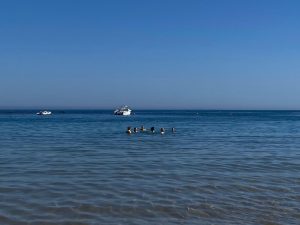This month’s blog post is written by Sarah, our Peer Support Coordinator, who is leading the new Peer Support Service this year at Edinburgh Women’s Aid.
Hello, my name is Sarah and I am excited to have joined the team as Peer Support Coordinator. Our Peer Support Service is an exciting new project at EWA. Our service recognises that women should be at the centre of their recovery by providing a safe community to women who have experienced domestic abuse. Through group discussion and a variety of activities, we aim to support attendees while they are regaining their independence and understanding of themselves. Our closed groups are held over 10 sessions, with up to 8 women in each group.
So many things are changed in your life when you have been through domestic abuse, but the change that you face in yourself can be really hard to start dealing with. The Peer Support Service offers women a dedicated time every week to focus on themselves. By discussing topics such as identifying needs and boundaries, finding coping mechanisms and combating self-esteem issues (things many women might struggle with anyway!), I hope attendees leave our sessions starting to rediscover who they are.
Aside from our discussion groups, these meet ups are an opportunity for women to explore a small slice of what Edinburgh has to offer. Having lived here for so many years, I was shocked at how many incredible things happen in Edinburgh that I had no idea about! Our first two groups have started in May, and I am excited to be including activities such as; cold water swimming, creative writing sessions, embroidery groups, trauma yoga classes and gallery tours. My hope is that members might discover a new hobby, rekindle an interest they have lost… or even feel safe enough to say that they dislike an activity that we have done! These groups are spaces for women to express themselves without judgement.
At the end of these sessions, there will be a number of options for women to actively choose how to continue with support. If they feel comfortable doing so, the groups can continue independently as a social outlet, but we will also be signposting members to alternative community groups based on their interests. Internally, we will begin to run training for women to become one to one peer supporters at EWA and eventually group facilitators for the Peer Support Service.
It is with an immense sense of pride that I can say the women in our groups have already expressed that they feel supported, challenged and empowered by our group sessions together. My hope is that the Peer Support Service provides a stepping stone that encourages these incredible women to engage in their community, focus on themselves and maintain healthy relationships with those around them.

A few members of the Peer Support Group cold water swimming earlier this year!